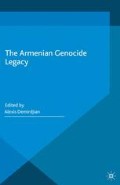Abstract
The past is often difficult to grasp, even when it is directly related to one’s family history. The collective memory of historical injustices can be warped by time, overlaid by more recent events, and filtered through the lens of vested interests only too willing to expropriate the past in order to score points in the present. Cultural production, although clearly created and thus subjective by nature, offers survivor generations the opportunity to deal in an imaginative and productive manner with past suffering which has been transmitted into their lives through intergenerational dialogue, be it by intention or default.
Access this chapter
Tax calculation will be finalised at checkout
Purchases are for personal use only
Preview
Unable to display preview. Download preview PDF.
Notes
See E. Sensenig-Dabbous (2008) ‘“Race: Arab, Sex: Terrorist”–The Gender Politics of Political Violence in the Middle East’, in Y. Yacoub (ed.) Violence, Realities and Concerns ( Beirut: Notre Dame University Press ).
This author helped develop several alternative hiking and bus tours for the city and province of Salzburg. An example of the culture-historical trauma nexus was the walking tour of Salzburg in which artists as diverse as Mozart and contemporary novelist Thomas Bernhard were highlighted. In commemoration of the 50th anniversary of the Anschluss (annexation) of Austria by Hitler in 1938, various publications brought, until then, under-researched aspects of the era to light. In G. Sensenig (1990) ‘Fremdarbeiter beim Bau der Dr. Todtbrücke in der Gauhauptstadt Salzburg’, in R. Ardelt and H. Hautmann (eds) Arbeiterschaft und Nationalsozialismus ( Vienna: Europaverlag ), as well as in a variety of newspaper and magazine articles, the literary and historical were combined to provide tourists with insights into the experience of slave labor during the Third Reich.
S. Lindqvist (1989) Grabe, wo du stehst. Handbuch zur Erforschung der eigenen Geschichte (trans. M. Dammeyer) ( Bonn: Dietz Verlag).
Maria Mies is considered to be the founder of the ‘Betroffenheit’ school of thought in Central Europe. This author applied feminist theories on ‘affectedness’, or subjectivity, in research undertaken on the Third Reich, as well as the experience of ‘guest workers’ in the post-war economic boom period following the Second World War. See C. Müller (2010) ‘Parteilichkeit und Betroffenheit’, in R. Beck and B. Kortendiek (eds) Handbuch Frauen- und Geschlechterforschung, Theorie, Methoden, Empirie (3rd edn.) (Wiesbaden: Verlag Geschlecht und Gesellschaft), pp. 340–3.
M. Luther King Jr. (1963) Letter from a Birmingham Jail, African Studies Center, University of Pennsylvania, http://www.africa.upenn.edu/Articles_Gen/Letter_Birmingham.html.
Author information
Authors and Affiliations
Editor information
Editors and Affiliations
Copyright information
© 2016 Eugene Sensenig-Dabbous
About this chapter
Cite this chapter
Sensenig-Dabbous, E. (2016). The Musa Dagh History Hike: Truth-Telling, Dialogue and Thanatourism. In: Demirdjian, A. (eds) The Armenian Genocide Legacy. Palgrave Studies in the History of Genocide. Palgrave Macmillan, London. https://doi.org/10.1007/978-1-137-56163-3_15
Download citation
DOI: https://doi.org/10.1007/978-1-137-56163-3_15
Publisher Name: Palgrave Macmillan, London
Print ISBN: 978-1-349-57402-5
Online ISBN: 978-1-137-56163-3
eBook Packages: HistoryHistory (R0)

